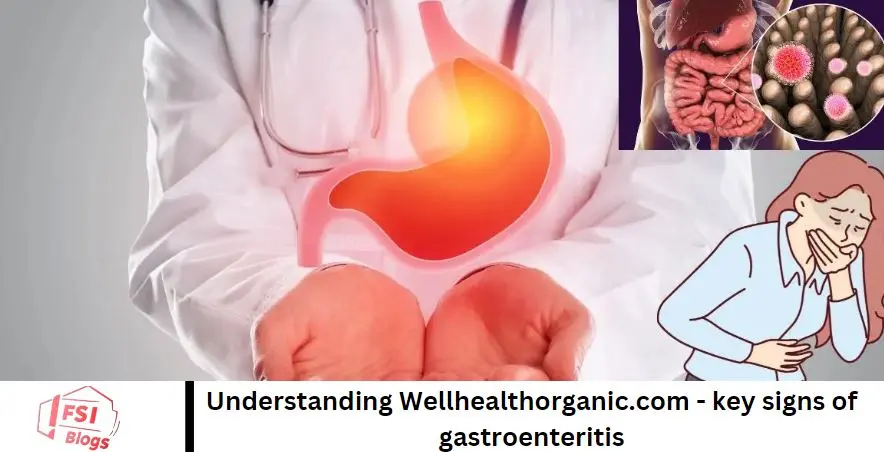Gastroenteritis, commonly known as stomach flu, is an inflammation of the stomach and intestines, often triggered by viral or bacterial infections. It can lead to uncomfortable symptoms that may disrupt daily life. Recognizing the critical signs of gastroenteritis is crucial for timely intervention and effective management. Symptoms typically include diarrhea, vomiting, abdominal cramps, and fever, which can vary in intensity depending on the underlying cause. This article will delve into the primary indicators of gastroenteritis, helping you identify the condition early and seek appropriate care. By understanding these signs, you can take proactive steps to protect your health and well-being.
What is gastroenteritis?
Gastroenteritis refers to inflammation of the stomach and intestines, which leads to sensations of swelling and discomfort. This condition often manifests through symptoms such as nausea, vomiting, abdominal pain, and diarrhea.
Typically, gastroenteritis arises from infections in the gastrointestinal (GI) tract, commonly caused by bacteria and viruses, which can lead to food poisoning and stomach flu. Additionally, exposure to certain chemicals may also result in gastroenteritis.
May you also like it:
WellHealthOrganic How to Build Muscle and Increase Muscle Growth Tips in Hindi
Easily Remove Dark Spots From Your Face With The Help Of Lemon Juice Know Home Remedies
Acute gastroenteritis symptoms
According to the National Institute of Diabetes and Digestive and Kidney Diseases, common symptoms of gastroenteritis include:
- Abdominal pain
- Nausea
- Vomiting
- Loose, watery diarrhea
- Fever (in some cases)
Immediate medical attention is necessary if a person experiences any of the following:
- Changes in mental state, such as lethargy or confusion
- High fever in older children and adults, or any fever in infants
- Diarrhea lasting longer than two days
- Frequent vomiting
- Six or more loose stools in one day
- Severe pain in the rectum or abdomen
- Black, tarry stools
- Stools containing blood or pus
Additionally, urgent medical care is required for symptoms of dehydration, which may include:
- Dry mouth and extreme thirst
- Dizziness, lightheadedness, or fainting
- Sunken eyes or cheeks
- Decreased urination
- Fatigue
- Decreased skin turgor (skin that doesn’t return to normal quickly when pinched)
Types of gastroenteritis
Types of Gastroenteritis
- Viral Gastroenteritis:
- Norovirus: A highly contagious virus often associated with outbreaks in crowded places.
- Rotavirus: Common in children, this virus is a leading cause of severe diarrhea.
- Bacterial Gastroenteritis:
- Salmonella: Often linked to contaminated food or water.
- E. coli: Some strains can cause severe stomach cramps and diarrhea.
- Campylobacter: Typically found in undercooked poultry and unpasteurized milk.
- Parasitic Gastroenteritis:
- Giardia: A parasite that can be contracted from contaminated water.
- Cryptosporidium: Often found in recreational water and can cause severe diarrhea.
- Chemical Gastroenteritis:
- Caused by exposure to toxic substances or excessive alcohol consumption.
- Foodborne Gastroenteritis:
- Results from eating contaminated or spoiled food, regardless of the causative organism.
Understanding these types can help identify the source of infection and determine the appropriate treatment.
How common is this condition?
Gastroenteritis is a very common condition, affecting millions of people worldwide each year. In the United States alone, it is estimated that about 5 million cases occur annually. It is particularly prevalent in children, with viral gastroenteritis being one of the leading causes of hospitalization in young children. Outbreaks often happen in crowded settings such as schools, nursing homes, and cruise ships, contributing to its widespread nature.
What are the signs and symptoms of gastroenteritis?
Signs and Symptoms of Gastroenteritis
- Abdominal Pain: Cramping and discomfort in the stomach area.
- Nausea: A feeling of sickness that may lead to vomiting.
- Vomiting: The expulsion of stomach contents, which can be frequent in severe cases.
- Diarrhea: Loose, watery stools that may occur several times a day.
- Fever: A mild fever may sometimes develop, often accompanying other symptoms.
- Fatigue: General weakness and tiredness due to fluid loss and inflammation.
- Loss of Appetite: Reduced desire to eat or drink.
- Dehydration Symptoms: Such as dry mouth, extreme thirst, dizziness, and decreased urination.
Recognizing these symptoms early can help manage the condition effectively and seek appropriate medical care when necessary.
How long does gastroenteritis last?
Gastroenteritis typically lasts 1 to 3 days, though symptoms can persist for up to a week in some cases. The duration may vary depending on the cause, such as viral or bacterial infections. Most individuals start to feel better within a few days, but it’s essential to stay hydrated and seek medical attention if symptoms worsen or last longer than expected.
What is the main cause of gastroenteritis?
Gastroenteritis occurs when the immune system activates to protect the stomach and intestines from harm. It dispatches inflammatory cells to combat infections and repair damaged tissues.
This response is typically acute, temporarily reacting to a short-term threat or injury. It generally resolves quickly, with inflammation subsiding shortly after the issue is addressed. Persistent gastroenteritis, lasting beyond the usual timeframe, is uncommon.
What are the specific causes of acute gastroenteritis?
Specific Causes of Acute Gastroenteritis
- Viral Infections:
- Norovirus: Commonly responsible for outbreaks, often linked to contaminated food or water.
- Rotavirus: A leading cause of gastroenteritis in infants and young children.
- Bacterial Infections:
- Salmonella: Frequently associated with undercooked poultry, eggs, or contaminated produce.
- Escherichia coli (E. coli): Certain strains can cause severe gastrointestinal symptoms.
- Campylobacter: Often found in raw or undercooked meats, especially poultry.
- Parasitic Infections:
- Giardia: Transmitted through contaminated water sources.
- Cryptosporidium: Commonly associated with waterborne outbreaks.
- Foodborne Illnesses:
- Caused by consuming contaminated or spoiled food, regardless of the specific organism involved.
- Chemicals and Toxins:
- Exposure to harmful chemicals or excessive alcohol consumption can trigger gastroenteritis.
- Antibiotic Use:
- Disruption of normal gut flora due to antibiotics can lead to overgrowth of harmful bacteria.
Understanding these causes can help prevent and manage acute gastroenteritis effectively.
Is gastroenteritis contagious?
Infectious gastroenteritis is contagious. When you have an infection in your gastrointestinal system, it contaminates your stool, which can spread to others through contact. Microscopic traces of feces can remain on bathroom surfaces, diaper-changing areas, and people’s hands if not washed thoroughly. These traces can transfer to anyone who touches them or to food and water.
In contrast, chemical gastroenteritis is not contagious but can impact multiple individuals in a shared environment. If someone is exposed to toxic substances through food, water, or their surroundings, others in that setting may also become affected.
How Do You Catch Gastroenteritis Infections?
The most common way to contract a gastrointestinal infection is through contaminated food or water. Additionally, you can become infected by touching an infected person or coming into contact with surfaces contaminated by an infected individual.
What are the risk factors for getting gastroenteritis?

Risk Factors for Gastroenteritis
- Age: Children, especially those under five, are at a higher risk due to their developing immune systems.
- Weakened Immune System: Individuals with weakened immune systems, such as those with chronic illnesses or on immunosuppressive medications, are more susceptible.
- Living in Crowded Conditions: Environments like schools, daycare centers, and nursing homes increase the risk of outbreaks.
- Travel: Traveling to areas with poor sanitation or contaminated food and water sources can elevate the risk of infection.
- Improper Food Handling: Poor food hygiene practices, such as inadequate cooking or cross-contamination, increase the likelihood of foodborne gastroenteritis.
- Contaminated Water: Drinking or swimming in contaminated water can lead to infections.
- Recent Antibiotic Use: Taking antibiotics can disrupt normal gut flora, making individuals more vulnerable to infections.
- Contact with Infected Individuals: Close contact with someone with gastroenteritis increases the transmission risk.
What are the possible complications of acute gastroenteritis?
Most cases of gastroenteritis are brief and resolve on their own. However, the primary complication to watch for is dehydration, which poses a greater risk for children and older adults.
Frequent diarrhea or vomiting can lead to significant fluid and electrolyte loss. If these are not replaced quickly, dehydration and potential electrolyte imbalances can occur.
In cases where gastroenteritis lasts longer than usual, it may begin to cause damage to the stomach and intestines, potentially leading to complications such as ulcers that can result in bleeding. Only certain types of gastroenteritis are known to persist for extended periods.
Additionally, specific causes of gastroenteritis may have side effects distinct from the condition itself. Some infections or toxins can lead to more lasting damage to the body.
Individuals with weakened immune systems and those lacking access to clean water, proper nutrition, sanitation, and healthcare are particularly vulnerable to gastroenteritis. They may experience more frequent and prolonged episodes of the illness.
Children in developing countries and seniors in long-term care facilities are at heightened risk of severe complications due to their generally lower health status.
Advantages and Disadvantages of Understanding Gastroenteritis Symptoms
Advantages
- Early Detection: Recognizing symptoms allows for prompt medical intervention, reducing the risk of complications.
- Informed Decision-Making: Awareness of symptoms helps individuals decide when to seek medical attention or manage symptoms at home.
- Prevention of Spread: Understanding contagious aspects can promote better hygiene practices, reducing community transmission.
- Empowerment: Knowledge empowers individuals to take proactive steps in prevention and management, leading to healthier choices.
- Reduced Anxiety: Familiarity with symptoms can alleviate fears and uncertainties during illness, promoting a calm approach to treatment.
Disadvantages
- Misinterpretation: Symptoms may overlap with other conditions, leading to potential misdiagnosis or unnecessary worry.
- Overreliance on Self-Diagnosis: Some individuals may avoid seeking professional help, relying solely on symptom recognition.
- Stigma: Awareness of gastroenteritis symptoms may create a stigma around illness, particularly in social settings.
- Information Overload: Excessive information about symptoms and causes can overwhelm individuals, making it difficult to discern what is relevant.
- Variability in Symptoms: Symptoms can vary significantly between individuals, leading to confusion about the severity of one’s condition.
Frequently Asked Questions
What is gastroenteritis?
Gastroenteritis is inflammation of the stomach and intestines, typically caused by infections. It leads to symptoms like diarrhea, vomiting, and abdominal pain.
What are the critical signs of gastroenteritis?
Common signs include abdominal pain, nausea, vomiting, loose, watery diarrhea, and sometimes fever.
How is gastroenteritis transmitted?
Infectious gastroenteritis spreads through contaminated food or water, contact with infected individuals, or touching contaminated surfaces.
How long does gastroenteritis last?
Most cases resolve within 1 to 3 days, though symptoms can sometimes last up to a week.
What complications should I watch for?
The primary complication is dehydration, particularly in children and older people. Severe dehydration requires immediate medical attention.
When should I seek medical help?
You should seek medical attention if symptoms persist for more than two days, if blood is present in the stool, if severe abdominal pain occurs, or if signs of dehydration occur.
Can gastroenteritis be prevented?
Practicing good hygiene, such as washing hands regularly, ensuring food safety, and avoiding contaminated water, can help prevent gastroenteritis.
Who is at higher risk for gastroenteritis?
Children, older people, and individuals with weakened immune systems or those living in crowded conditions are at greater risk.
Conclusion
Gastroenteritis is a common yet significant health concern affecting individuals of all ages. Recognizing the key signs—such as abdominal pain, nausea, vomiting, and diarrhea—is essential for timely intervention and effective management. By understanding the causes, risk factors, and potential complications, individuals can take proactive steps to prevent infection and seek appropriate medical care when necessary. Maintaining good hygiene practices and staying informed about gastrointestinal health can help reduce the impact of gastroenteritis and promote overall well-being.




